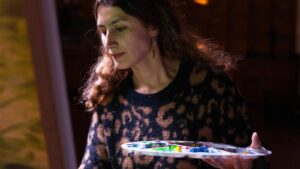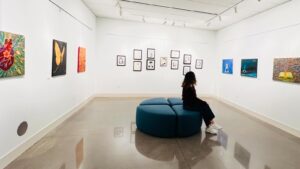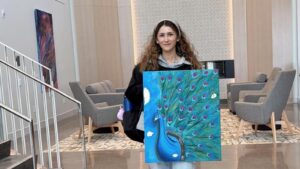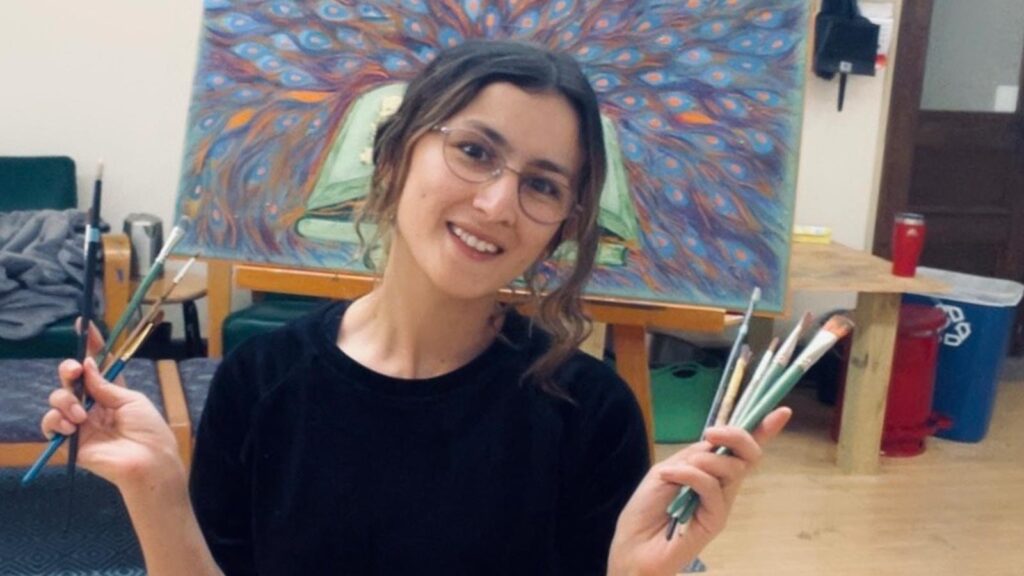April 22, 2025
A brush with hope: Halima Amiri’s story of healing
When the Taliban forces returned to Afghanistan in 2021, over 3.5 million Afghani people found themselves newly displaced internally. Among the displaced was Halima Amiri ’26, a young woman studying civil engineering at a military academy. With the administration change, Amiri could not continue her education.
 As a member of the Afghani military, Amiri was at high risk of being targeted by the Taliban if she remained in the country, so she was forced to flee from Afghanistan. She bounced between various safe houses in Afghanistan and refugee camps in Qatar before ultimately arriving in the United States, where she spent two months in New Jersey before relocating to Duluth, MN.
As a member of the Afghani military, Amiri was at high risk of being targeted by the Taliban if she remained in the country, so she was forced to flee from Afghanistan. She bounced between various safe houses in Afghanistan and refugee camps in Qatar before ultimately arriving in the United States, where she spent two months in New Jersey before relocating to Duluth, MN.
Despite being thrust into a new culture, separated from her home and family, it was within the safe house walls that Amiri was first able to confront her past trauma through art. “I didn’t have a lot when I was in the refugee camps, only a pencil and some paper,” she said. During this time, she developed a relationship with art that would help her sort through the traumas she experienced prior to her arrival in the United States.
Nurturing her artistic talents
“When I first came to Duluth, I didn’t have any friends. It can be so hard, especially during the winter,” she admitted. After admission into The College of St. Scholastica, she met Sarah Brokke Erickson, associate professor of Art, who urged Amiri to nurture her talent further. She took up a minor in Art, complementing her Computer Information Systems major and Data Analytics minor. “My advice for others would be to just get involved, join clubs and attend events where you can meet people; they all serve as a resource. Do not be afraid to reach out for help and ask for help when you need it.”
 This past semester, Amiri completed her senior capstone exhibition and got the opportunity to showcase her work to the community in the Student Center.
This past semester, Amiri completed her senior capstone exhibition and got the opportunity to showcase her work to the community in the Student Center.
Hope and Home
Her collection was named Hope and Home “to show beauty through the use of key symbols, that home is inside the heart and that it can grow from within. It was meant to inspire others by showing the beauty of what can be created with our hands.”
Some of the artwork within her capstone exhibition featured incredible stills of a series of people. “Some of them were people that I knew, and some of them, I just chose to draw free-handed,” Amiri noted.
When asked what she liked the most about art, Amiri said of the craft: “It makes me calm, and it’s a kind of therapy for me. Everybody has their own emotions, and we all have things that are bothering us. Painting inspires me to take care of my mental health and allows me to heal from the past. It’s expressing hope in something and inspiring others. That’s what I see in art.”
Finding her refuge
While art has become a form of therapy for Amiri, it has also served as a refuge in times of struggle. “It’s hard… not having family members is difficult and leads to depression. It’s hard to learn a new culture, but at the same time, it’s exciting.” Amiri hikes and walks along the lake, both for enjoyment and to combat the intense loneliness that results from living in a foreign culture. Amiri also notes that the Afghani community in Duluth is rather small, but every so often, she gets the opportunity to travel down to the Twin Cities, where there is a larger group to connect with.
 Even still, Amiri has formed a small but mighty network, affording her the opportunity to do some amazing things within her new-found communities. In fact, she was identified as a “trailblazing leader” and selected as a speaker for the Duluth Chamber of Commerce Women in Leadership Conference in September 2024.
Even still, Amiri has formed a small but mighty network, affording her the opportunity to do some amazing things within her new-found communities. In fact, she was identified as a “trailblazing leader” and selected as a speaker for the Duluth Chamber of Commerce Women in Leadership Conference in September 2024.
While there, she spoke about her experiences as a refugee joining the community leaving her family behind and losing everything. “Once you see lots of trauma and you have bad memories, it’s hard to stand on your own feet again. It was all about encouraging and motivating women, and it was a powerful space to be in. How can we help each other to stand and be leaders?”
In the constant pursuit of the love of learning, Amiri intends to continue perfecting her craft. Despite the uncertainty surrounding her artistic future, she has appreciated the opportunity to share her story and her artwork with the local community through other avenues. “Life can give everyone a hard time, and we as a community, we as humans can be helpful to each other. So always ask for help, there’s always going to be someone who is willing to help.”


